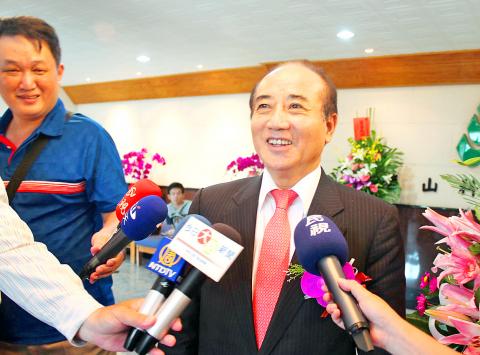Chinese Nationalist Party (KMT) presidential hopeful Hung Hsiu-chu (洪秀柱), in response to Time magazine’s description of Democratic Progressive Party (DPP) presidential candidate Tsai Ing-wen (蔡英文) as the likely winner of January’s election, said yesterday it was because the US has little understanding of her, as, unlike Tsai, she has only recently emerged as a candidate.
After Tsai made it onto the cover of Time, Hung congratulated her adversary in a radio interview yesterday and said it was “good” that she appeared on the cover.
When asked about the magazine referring to Tsai as possibly the nation’s next leader, Hung said it was because Tsai has been preparing for the presidential election for years and the US has a good understanding of her.

Photo: Lin Meng-ting, Taipei Times
Hung said that not only the US, but even the Chinese government is probably at a loss about how she has become a contender for president.
“[The magazine] said that only because they do not know me at all,” Hung said.
Hung also criticized what Tsai calls a “new model” of economic development — which is to lessen the nation’s dependence on China by building global ties and championing local brands — saying a candidate who is aiming to be a nation’s leader should refrain from using “adjectives” and provide concrete policies.
Later yesterday, Hung also reiterated her thoughts on visiting the US before the election, doubting it was necessary and saying that she would want to use the time to campaign in Taiwan, “where the votes are.”
“Visiting the US before the election is a convention created by [former president] Chen Shui-bian (陳水扁), who went there because [Washington] had misgivings about the DPP taking over the presidential office, but many of the KMT’s policies are consistent with those of the US, which has a good understanding of the KMT. That’s why I’m not planning a visit,” Hung said.
Separately yesterday, Legislative Speaker Wang Jin-pyng (王金平), who on Thursday seemed poised to throw his support behind Hung, but later the same day turned down Hung’s offer to be chief executive of her campaign headquarters, said he declined the offer because the speaker needs to remain neutral and he has a packed schedule.
“I have Hung’s understanding and acceptance [of the decision],” Wang said.
Meanwhile, KMT Chairman Eric Chu (朱立倫) was vague yesterday on whether the party’s charter would be amended so that Wang could remain legislative speaker.
Hung said on Thursday that the party’s charter would not be revised and that if Wang wanted to stay on as legislative speaker (and therefore a legislator) he could only do so by running in the legislative elections, as the charter stipulates that legislators-at-large can only be re-elected once.
“We should respect the speaker’s [decision]; the KMT’s nominations will be made in accordance with the set regulations,” Chu said.

A preclearance service to facilitate entry for people traveling to select airports in Japan would be available from Thursday next week to Feb. 25 at Taiwan Taoyuan International Airport, Taoyuan International Airport Corp (TIAC) said on Tuesday. The service was first made available to Taiwanese travelers throughout the winter vacation of 2024 and during the Lunar New Year holiday. In addition to flights to the Japanese cities of Hakodate, Asahikawa, Akita, Sendai, Niigata, Okayama, Takamatsu, Kumamoto and Kagoshima, the service would be available to travelers to Kobe and Oita. The service can be accessed by passengers of 15 flight routes operated by

GIVE AND TAKE: Blood demand continues to rise each year, while fewer young donors are available due to the nation’s falling birthrate, a doctor said Blood donors can redeem points earned from donations to obtain limited edition Formosan black bear travel mugs, the Kaohsiung Blood Center said yesterday, as it announced a goal of stocking 20,000 units of blood prior to the Lunar New Year. The last month of the lunar year is National Blood Donation Month, when local centers seek to stockpile blood for use during the Lunar New Year holiday. The blood demand in southern Taiwan — including Tainan and Kaohsiung, as well as Chiayi, Pingtung, Penghu and Taitung counties — is about 2,000 units per day, the center said. The donation campaign aims to boost

ENHANCING EFFICIENCY: The apron can accommodate 16 airplanes overnight at Taoyuan airport while work on the third runway continues, the transport minister said A new temporary overnight parking apron at Taiwan Taoyuan International Airport is to start operating on Friday next week to boost operational efficiency while the third runway is being constructed, the Ministry of Transportation and Communications said yesterday. The apron — one of the crucial projects in the construction of the third runway — can accommodate 16 aircraft overnight at the nation’s largest international airport, Minister of Transportation and Communications Chen Shih-kai (陳世凱) told reporters while inspecting the new facility yesterday morning. Aside from providing the airport operator with greater flexibility in aircraft parking during the third runway construction,

American climber Alex Honnold is to attempt a free climb of Taipei 101 today at 9am, with traffic closures around the skyscraper. To accommodate the climb attempt and filming, the Taipei Department of Transportation said traffic controls would be enforced around the Taipei 101 area. If weather conditions delay the climb, the restrictions would be pushed back to tomorrow. Traffic controls would be in place today from 7am to 11am around the Taipei 101 area, the department said. Songzhi Road would be fully closed in both directions between Songlian Road and Xinyi Road Sec 5, it said, adding that bidirectional traffic controls would